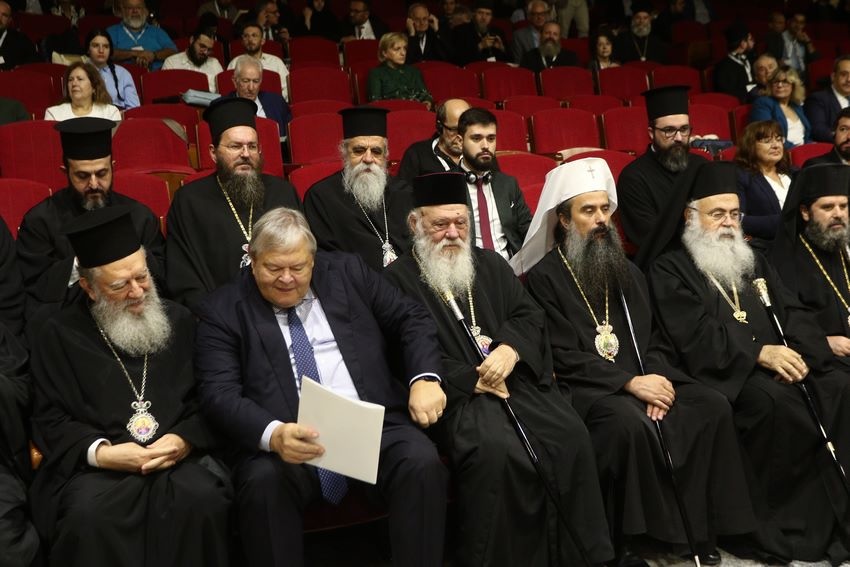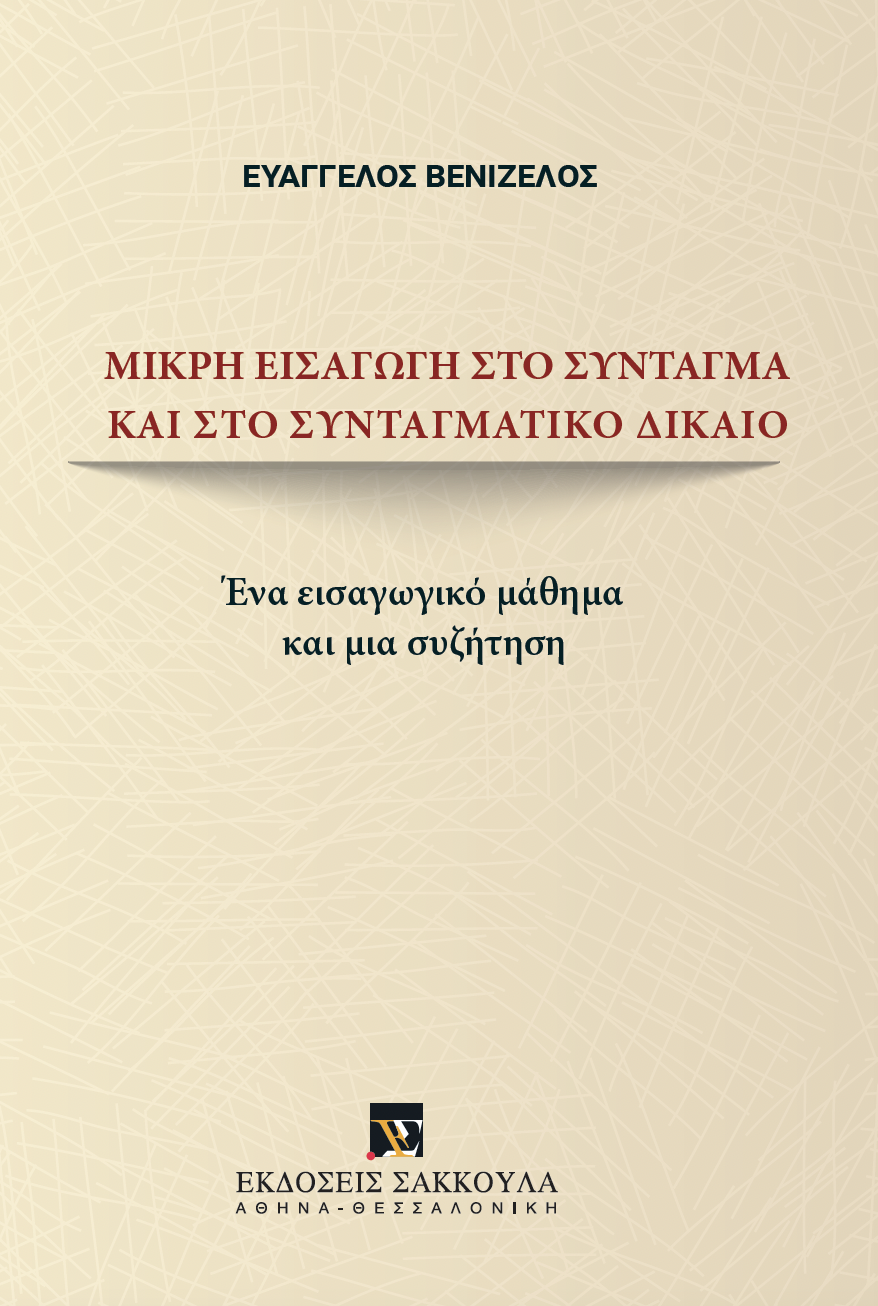Thessaloniki, September 30, 2025
Evangelos Venizelos, Professor Emeritus of Constitutional Law at the Aristotle University of Thessaloniki, has served as Vice President of the Greek Government, and as Minister of Finance and Foreign Affairs. The following speech of his is from the 2nd International Scientific Conference of the journal Theologia, organized by the Holy Synod of the Church of Greece, on the theme “Orthodox Theology and the Ontology of Technology.”
Technology as a democratic challenge
I have been asked to sketch, briefly, the political-theoretical dimension of our theme. I will speak, therefore, about technology as a democratic challenge, as my colleague Ms. Kefalea has already announced. But I must begin with the clarity of terms; without that, we cannot arrive at the requisite “wisdom.”
Avoiding platitudes, I shall use “technology” to mean “new technologies”: chiefly information and communications technologies, of course artificial intelligence and machine learning, together with the internet and its advanced iterations—now the Internet of Things, augmented reality, and the cluster of developments that compose what we used to call the Fourth Industrial Revolution. In other words, a new epistemological paradigm has taken shape. Within this rubric of new technologies I also include biotechnology in its entirety. It is no accident that the most recent Nobel Prize in Chemistry went to a specialist in artificial intelligence who used it to decipher the evolution of proteins.
The larger problem is that this technological evolution is not tethered to territory. It has no domain; it lies beyond the reach of state authority—not even the authority of the United States, where many tech behemoths and major laboratories reside. It unsettles state sovereignty and, at the same time, international organizations, which in any case are in deep crisis. We are confronted, then, with a new sphere—one that, by its nature, resists political oversight, or at least effective oversight: oversight that is international or, in any event, exercised by the few countries that still retain some vestige of political sovereignty in the realm of new technologies. They are very few indeed. The European Union, though a regulatory giant that imposes rules, lacks the technological power to set meaningful limits.
Nor is “democracy” a self-evident term. When I speak of technology as a democratic challenge, I refer to the challenge faced by representative and liberal democracy. Representative liberal democracy—democracy bound to the rule of law and to the protection of fundamental rights and legal safeguards—is constitutional democracy: a very recent historical phenomenon, scarcely two centuries old.
Moreover—and this is the crux—democracy is a minority and Western-centric system, under internal and external contestation. Its global influence has shrunk dramatically. Today there are 88 democracies in the world; only 29 are fully liberal, while another 59 are merely electoral. On the other side, there are more than 91 authoritarian regimes—some “electoral” in name only, others without elections at all. To speak quantitatively: only some 900 million people—roughly one-tenth of the global population—live under democratic conditions. That is how minority and Western-centric the democratic form of governance truly is. And because democratic and authoritarian systems coexist, democracy may be suffering a kind of axiological erosion, as authoritarianism exerts a morbid allure. Recent surveys suggest that among Europe’s younger generation—so-called Gen Z—some 21 percent, nearly a quarter, say they would prefer to live under an authoritarian regime, even while enjoying the luxuries of European democracy.
In recent months, political developments in the United States have also laid bare a value conflict between the two pillars of Western democracy. American democracy now declares a fundamentally different understanding than European democracy when it comes to political correctness, pluralism, freedom of speech, and the treatment of democracy’s internal adversaries, and so on.
Most consequentially, technological change is transforming the anthropology of democracy. In 1957, when the Soviet Union placed Sputnik in orbit, Hannah Arendt felt compelled to write The Human Condition because she believed the world, and the paradigm by which we grasp it, was changing in anthropological terms. Imagine how she would react now, faced with transformations that alter how civil society is constituted across borders; how political society forms; how “society” appears both as public opinion and as “the people” in the broader and narrower sense—as an electorate.
The public sphere, the forum publicum, has been altered. The market—as market and as forum—functions differently. Social and political behaviors are reshaped in decisive ways; the role of political parties and of comprehensive programmatic platforms has diminished; the aesthetic of democracy has shifted; our very consciousness of History is shaken, or at least obscured. The way the internet and public discourse function worldwide simplifies everything, and this simplification feeds populism.
Distance and time have collapsed. Mega-data are at the disposal of actors we cannot identify. We face a deluge of information without the capacity to synthesize it as knowledge. Crucially, democratic behavior is influenced—often exogenously—by outside forces. We have seen this in the United States. We saw it recently in Romania, where presidential elections were annulled because the first-round victor was found by judicial decision to have benefited from illicit Russian support and influence. Through bots, algorithms, deep-fake news, and the cultivation of post-truth—everyone with a “truth” of their own; the ethics of conviction displacing the ethics of duty and responsibility, as Max Weber, a great political theologian, would put it—we arrive at a fearful democracy: a polity anxious about electoral outcomes because it cannot know how those outcomes may be swayed.
At the same time, democratic choices once presumed to carry a presumption of correctness now find themselves challenged by the choices proposed by artificial intelligence. Right and wrong become radically fluid. In practice, AI and its supporting technologies operate in an “apocalyptic” mode—revealing a new, quasi-ex cathedra truth, but one generated inside a black box. This raises a profound question for political theology, perhaps even for theology proper. Faith is personal; it belongs to the forum internum. Voting, too, is individual. Yet democracy—like the Church—is a collective subject. The corpus electoralis, now pressured and endangered by new technology, is in some sense akin to the corpus mysticum. We must therefore consider how both are exposed to a different order of “alteration,” and whether such alteration can be accepted—democratically, politically, constitutionally, and theologically.
More consequential still: the technological barriers to direct participation are dissolving. Representative—not direct—democracy evolved historically into a liberal, constitutional regime, with its attendant values. Modern democracy is representative because, technically, direct democracy could not function. Representation drew, in no small part, on the synodal organization of the Church and on the role of the Bishop as celebrant of the Eucharist, standing in persona Christi.
Today, however, technical means exist for citizens’ direct and continuous participation in deliberation, organized or not. There are, to be sure, welcome conveniences—a kind of ongoing democratic Pentecost. The Tower of Babel falls away: everyone “speaks” every language, thanks to instantaneous translation from and into all tongues. Avatars, holograms—one can be omnipresent in a campaign. There is a perpetual, diffuse referendum; polling on every topic at every moment. Elections can thus fall under private control. More fundamentally, the technological preconditions of representative democracy—and the presumption of parliamentary representation—are being nullified. The internet now claims the presumption of representation that once belonged, in a lesser way, to opinion polls.
Hence a question that has occupied me since 2008: the question of post-representative democracy. By this I do not mean a democracy that is “minus,” but “plus”: a model that preserves representative democracy through new institutions; that seeks a renewed political theory in order to safeguard the liberal-constitutional settlement of representation.
We may also need, once again, to reflect through the lens of political theology. Can there be a post-representative democracy? I believe so, provided we retain the core guarantees of liberal democracy. But can there be a post-representative ecclesiology? How would artificial intelligence function as a quasi-elder, as spiritual father? We cannot always know whether “reality” is reality or a counterfeit; and there is the problem of a false eschatology—digital immortality offered as a substitute for the Resurrection, however conceived. Yet while faith is an unmediated personal relation to God, without relation and representation there is no Church, no apostolic succession, no episcopal-centered order.
For reasons of time I will not dwell on the relationship between democracy and algorithmic governance, which goes far beyond the mere influence of algorithms and AI on administration. Around the world we are beginning to witness the substitution of the person—as a being-in-relation, to God and to the other—by systems of artificial intelligence. The most recent, striking example is the appointment—before the Albanian Parliament—of a “robot,” in truth an AI entity, as a member of government charged with managing public contracts and procurement, a supposed guarantor of transparency. This is a sign of the democratic and technical challenges that arise from the deep affinity between political theory and theology—whence “political theology”—and it composes a complex problem, the very problem engaging this conference.
Plainly, neither our political-theoretical nor our theological conversation can culminate in a new philoluddism. In the early nineteenth century, British textile workers confronted machines that displaced them and organized the Luddite movement to smash those machines and save their livelihoods. We cannot, as latter-day Luddites, smash artificial intelligence. It eludes us: immaterial, networked, with origins we cannot pinpoint, unbound by territory. We are, in any case, within History. History goes on, and its end state is never precisely what anyone intended at the outset. We are, as has been often noted, amid a grave crisis of paradigm shift. The crisis is not “out there” in the facts; it concerns our capacity to apprehend them. It is epistemological.
We stand, then, before a colossal challenge for the human being, for human ontology. The question is whether we can grasp what we have made—and how our own complex nature can co-operate within this new paradigm. The answer will emerge gradually, at an accelerating pace—perhaps as a problem, perhaps as a solution. -
*Translated and published by Orthodox Observer
Relative link https://orthodoxobserver.org/technology-as-a-democratic-challenge/
Read the original speech in Greek.















